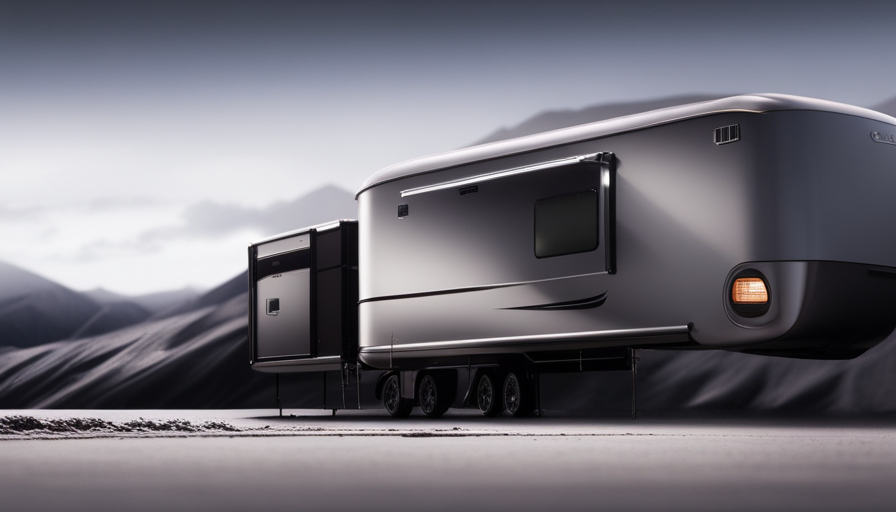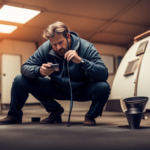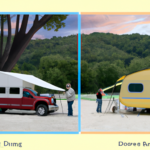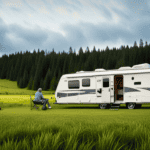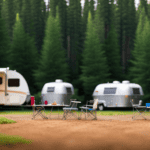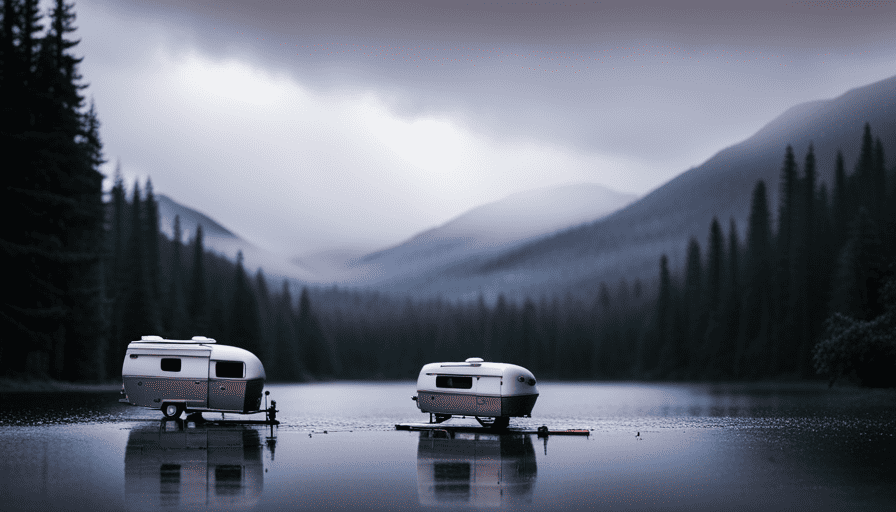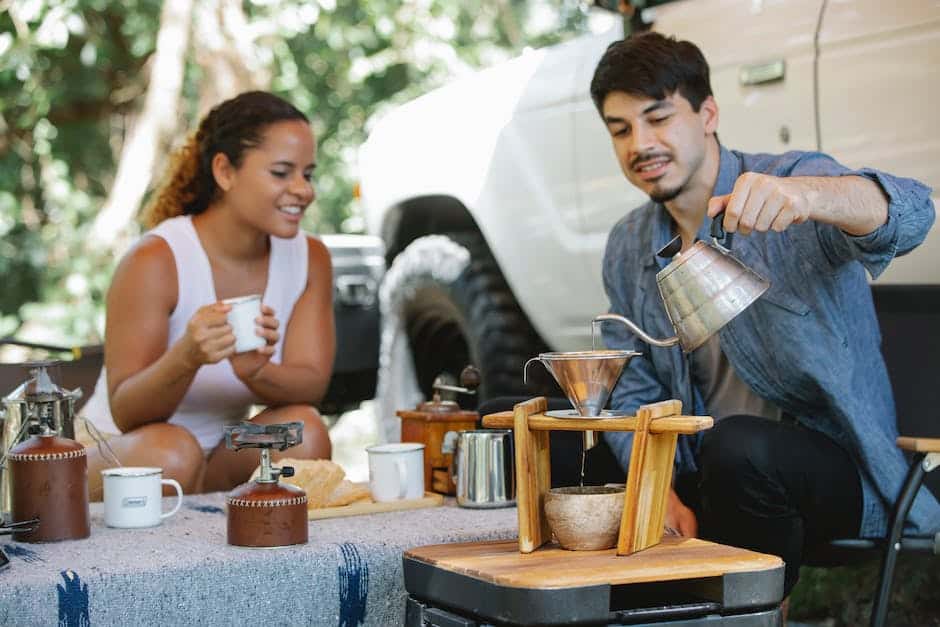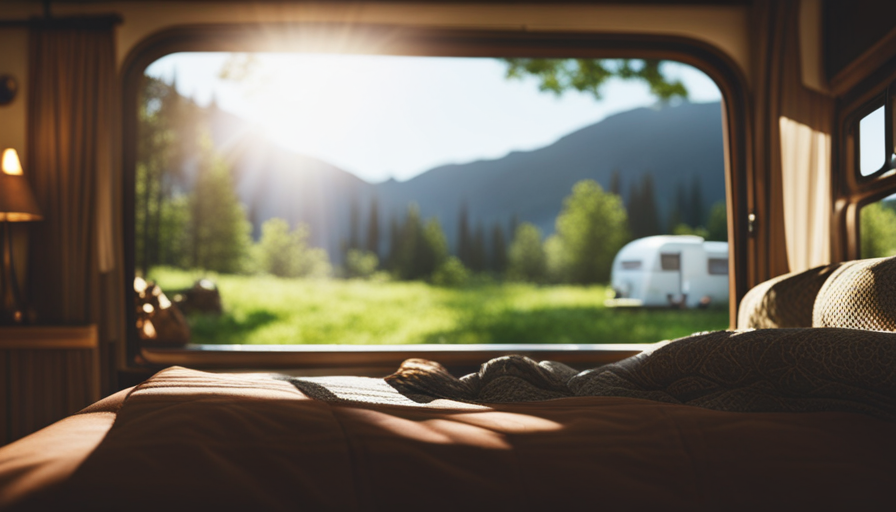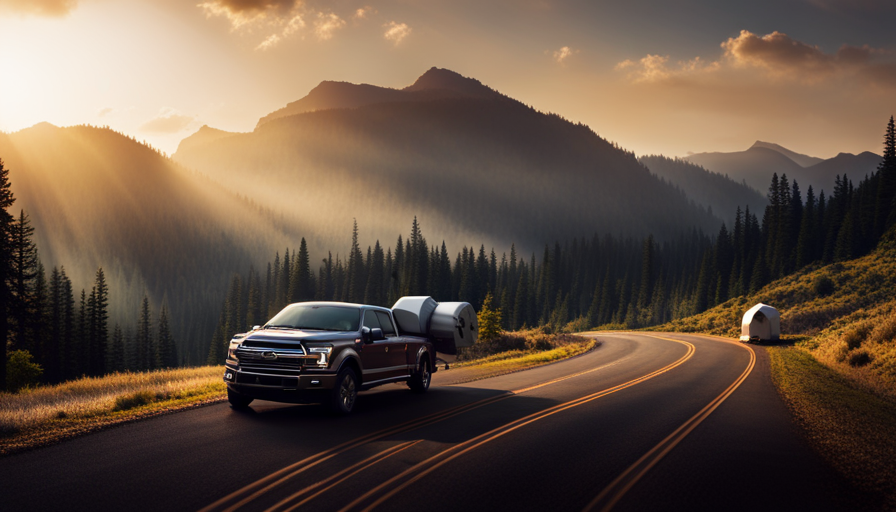Did you know that over 10 million Americans have chosen the lifestyle of owning a recreational vehicle (RV) and enjoy the freedom of traveling wherever they please? If you’re considering joining the RV enthusiast community and buying your own camper, it’s important to think about some important questions.
In this article, we will guide you through the process of buying a camper by providing you with a list of essential questions to ask. By considering your budget, travel needs, and preferences, as well as researching different types and models of campers, you can make an informed decision.
Inspecting the camper’s condition, considering its size and weight, and checking for necessary documentation and legal requirements are also crucial steps. And don’t forget to test drive or take a virtual tour before negotiating the price and terms.
Seek advice from experienced campers or professionals to ensure you’re making the right choice. Let’s get started on your journey to camper ownership!
Key Takeaways
- Consider budget, travel needs, and preferences when making a decision
- Research different types and models of campers
- Thoroughly inspect the camper’s exterior and interior for damage or wear
- Negotiate the price and terms based on fair market value and additional fees
Determine Your Budget and Financing Options
So, before you start daydreaming about the open road, let’s figure out how much you can afford and what kind of financing options are available to make your camper dreams a reality.
Determining affordability is the first step in your camper buying journey. Take a close look at your finances and determine how much you can comfortably spend on a camper. Consider factors such as your income, savings, and any existing debts or expenses. This will give you a clear idea of your budget and prevent you from overspending.
Once you have determined your budget, it’s time to explore financing options. Camper financing can be obtained through various sources, including banks, credit unions, and specialized lenders. Research different lenders and compare interest rates, loan terms, and repayment options. It’s important to find a financing option that suits your financial situation and offers favorable terms.
Additionally, you may want to consider other financing options such as leasing or renting a camper. These alternatives can provide more flexibility and lower upfront costs. However, it’s essential to carefully evaluate the terms and conditions of these options to ensure they align with your needs and preferences.
Now that you have a clear understanding of your budget and financing options, it’s time to consider your travel needs and preferences.
Consider Your Travel Needs and Preferences
When choosing a camper, think about what kind of travel experiences you envision and how you prefer to explore the great outdoors. Your travel preferences and camping lifestyle will play a crucial role in determining the right camper for you.
Here are three important aspects to consider:
-
Size and Amenities: Do you prefer a compact camper that’s easy to maneuver and park? Or do you need a larger camper with more amenities such as a kitchen, bathroom, and sleeping quarters? Consider the size and layout that aligns with your travel needs and preferences.
-
Off-Road Capability: If you enjoy off-road adventures and exploring remote areas, you might want to consider a camper that’s designed for rugged terrains. Look for features like high ground clearance, robust suspension, and durable construction to ensure your camper can handle the challenges of off-road travel.
-
Lifestyle Compatibility: A camper should complement your camping lifestyle. Are you a minimalist camper who enjoys the simplicity of tent camping? Or do you prefer the convenience of a fully-equipped camper with all the comforts of home? Consider how the camper aligns with your preferred camping style.
When considering your travel needs and preferences, it’s essential to ensure that the camper you choose is a good fit for your desired experiences.
Next, we’ll discuss how to research different types and models of campers.
Research Different Types and Models of Campers
Discover the fascinating array of camper options available and delve into the world of different types and models to find the perfect fit for your outdoor adventures.
Choosing the right camper type is essential in ensuring a comfortable and enjoyable camping experience. There are various options to consider, such as pop-up campers, travel trailers, fifth wheels, and motorhomes. Each type has its own advantages and disadvantages, so it’s important to research and compare different camper models.
When comparing different camper models, take into account factors such as size, layout, amenities, and towing capacity. Think about your specific needs and preferences, such as the number of people you’ll be traveling with and the level of comfort you desire. Consider whether you prefer a compact camper for easy maneuverability or a larger one for added space.
Additionally, think about the specific features and amenities that are important to you. Do you need a full kitchen and bathroom, or are you comfortable with more basic facilities? Are you interested in slide-outs for additional living space? Take the time to explore different models and determine which ones meet your requirements.
As you research and compare different types and models of campers, keep in mind that there is no one-size-fits-all solution. It’s important to find a camper that fits your specific needs and preferences. Once you have narrowed down your options, it’s time to inspect the camper’s condition and ensure that it is in good shape for your outdoor adventures.
Inspect the Camper’s Condition
When it comes to inspecting the condition of a camper, we always conduct a thorough examination of both the exterior and interior. We carefully check for any signs of damage or wear, such as dents, scratches, or leaks.
Additionally, we make sure to test all appliances, systems, and components to ensure they’re in proper working order.
Conduct a thorough inspection of the camper’s exterior and interior
Before you start exploring the inside of the camper, take a moment to give its exterior a careful inspection. Start by inspecting the exterior of the camper for any signs of damage or wear. Take note of any dents, scratches, or rust on the body of the camper. Check the windows and doors for any cracks or leaks. Look closely at the roof to ensure it’s in good condition and doesn’t have any leaks or signs of water damage.
Moving on to the interior, inspect the floors, walls, and ceiling for any signs of water damage, mold, or mildew. Check the appliances and fixtures to make sure they’re in working order. Look for any signs of pests or infestation.
Once you have thoroughly inspected the exterior and interior, it’s time to check for any signs of damage or wear on the camper’s components and systems.
Check for any signs of damage or wear
Now take a moment to thoroughly examine the camper’s components and systems for any signs of damage or wear. It’s crucial to ensure that the camper is in good condition before making a purchase. Here are four key areas to pay attention to:
-
Signs of water damage: Look for any discoloration, soft spots, or mold/mildew growth on the walls, ceilings, or floors. These could indicate leaks or water infiltration that may lead to costly repairs in the future.
-
Signs of structural damage: Check for any cracks, dents, or warping in the exterior walls, roof, or chassis. These issues could compromise the integrity of the camper and pose safety risks.
-
Wear and tear on furniture and fixtures: Inspect the upholstery, cabinets, and appliances for any signs of excessive wear or damage. This’ll give you an idea of how well the camper’s been maintained.
-
Check the seals and caulking: Ensure that all windows, doors, and seams are properly sealed to prevent water leaks.
By thoroughly examining these areas, you can identify any potential issues and make an informed decision about the camper’s condition.
Now, let’s move on to testing all appliances, systems, and components to ensure they’re in working order.
Test all appliances, systems, and components to ensure they are in working order
To make sure everything is in perfect working order, don’t forget to test all appliances, systems, and components in the camper. You’ll be amazed at how smoothly everything runs! Start by testing the refrigerator, stove, oven, and microwave to ensure they’re functioning properly. Check the heating and cooling systems, including the air conditioner and furnace, to ensure they provide adequate temperature control. Test the water heater, water pump, and plumbing system to ensure a steady supply of hot and cold water. Don’t forget to check the electrical system, including the lights, outlets, and battery, as well as any entertainment systems. By thoroughly testing all appliances and systems, you can avoid any unexpected surprises while on the road.
Now, let’s consider the camper’s size and weight to ensure it meets your needs.
Consider the Camper’s Size and Weight
When considering the size and weight of a camper, it’s important to determine if it’s compatible with our tow vehicle. We must take into account any restrictions or limitations in terms of towing capacity and ensure that the camper falls within those parameters.
Additionally, it’s essential to consider the ease of towing and maneuvering the camper, as this will greatly impact our overall experience.
Finally, we should evaluate the available storage space and living area in relation to our needs, making sure it provides enough room for all our camping essentials and a comfortable living space for the duration of our trips.
Determine the size and weight restrictions of your tow vehicle (if applicable)
Consider determining the size and weight restrictions of your tow vehicle (if applicable) to ensure a seamless camping experience. It’s important to know the limitations of your vehicle before purchasing a camper, as exceeding these restrictions can lead to safety issues and potential damage.
Here are four key considerations when determining the size and weight restrictions:
-
Size limitations: Measure the available space on your tow vehicle to ensure the camper will fit properly and allow for safe towing.
-
Weight restrictions: Check the towing capacity of your vehicle to ensure it can handle the weight of the camper, including any additional gear or passengers.
-
Gross Vehicle Weight Rating (GVWR): Consider the maximum weight that your tow vehicle can safely handle, including the weight of the camper and its contents.
-
Tongue weight: Determine the maximum tongue weight that your tow vehicle can support, as this affects the stability and control while towing.
Considering these factors will help you make an informed decision and ensure a safe and enjoyable camping experience. Next, let’s explore the ease of towing and maneuvering the camper.
Consider the ease of towing and maneuvering the camper
Navigating the twists and turns of the road while towing a camper can be a thrilling adventure, but it’s essential to assess how easily the camper can be towed and maneuvered.
Towing capacity is a crucial factor to consider when buying a camper. You need to ensure that your tow vehicle can handle the weight of the camper without straining the engine or compromising safety.
Additionally, maneuverability is key, especially when navigating tight spaces or backing into campsites. Consider the overall length, width, and turning radius of the camper to ensure that it can be easily maneuvered without causing any difficulties or accidents.
By evaluating the towing capacity and maneuverability of the camper, you can ensure a smooth and hassle-free camping experience.
Speaking of storage and living area, let’s now evaluate the available space in relation to your needs.
Evaluate the available storage space and living area in relation to your needs
Now that you’ve considered the ease of towing and maneuvering the camper, it’s time to evaluate the available storage space and living area in relation to your needs.
This step is crucial in ensuring that you have enough room to store all your belongings and move around comfortably inside the camper. When evaluating storage options, consider factors such as the number and size of cabinets, closets, and compartments available.
Additionally, think about the layout of the living area and how well it maximizes the available space. Look for features like foldable furniture or innovative storage solutions that can help optimize the living area.
By carefully assessing the storage options and living space, you can ensure that the camper meets your requirements for a comfortable and practical living experience.
Next, we’ll explore how to evaluate the reputation and customer service of the seller to make an informed decision.
Evaluate the Reputation and Customer Service of the Seller
Assessing the seller’s reputation and quality of customer service is crucial when purchasing a camper. Evaluating the seller’s reputation can help ensure that you’re dealing with a trustworthy and reliable seller. You can start by checking online reviews and testimonials from previous customers. Look for any patterns or recurring issues that may raise concerns.
Additionally, consider reaching out to other camper owners or enthusiasts for recommendations or warnings about certain sellers.
Alongside reputation, evaluating the quality of customer service is equally important. A seller who provides excellent customer service is more likely to address any concerns or issues promptly and efficiently. Look for sellers who are responsive, knowledgeable, and willing to go the extra mile to assist you. This can make the buying process smoother and give you peace of mind knowing that you’ll receive support even after the purchase.
When assessing the seller’s reputation and customer service, it’s essential to consider these factors alongside other aspects of your camper purchase. Once you have evaluated the reputation and customer service quality, you can move on to checking for necessary documentation and legal requirements.
Check for Necessary Documentation and Legal Requirements
Explore the essential paperwork and legal prerequisites for purchasing a camper to ensure a smooth and secure transaction. Before finalizing the purchase, it’s crucial to obtain and review all the required documents.
Here are some key items to consider:
-
Title: Verify that the seller has a clear title for the camper, ensuring that it isn’t stolen or encumbered by any liens.
-
Registration: Check if the camper is registered and up to date with the relevant authorities. Ensure that the registration matches the seller’s name and address.
-
Insurance: Inquire about the insurance coverage on the camper. Request proof of insurance and confirm its validity.
-
VIN check: Conduct a Vehicle Identification Number (VIN) check to ensure the camper’s history, including accidents, repairs, and mileage, aligns with the seller’s claims.
-
Warranty: Determine if the camper comes with any warranty and understand its terms and conditions.
In addition to the necessary documentation, it’s crucial to be aware of any legal obligations involved in purchasing a camper. Familiarize yourself with local regulations regarding camper ownership, transportation, and camping restrictions.
By understanding the required paperwork and legal obligations, you can confidently proceed with the next step: test driving or taking a virtual tour to assess the camper’s condition and suitability for your needs.
Test Drive or Take a Virtual Tour
Take a spin or virtually tour the camper to get a feel for its interior layout and envision yourself on your next adventure. When buying a camper, it’s important to physically or virtually experience the space before making a decision.
Both options have their pros and cons.
A virtual tour allows you to explore the camper from the comfort of your own home. You can view detailed photos, videos, and 360-degree panoramas to get a sense of the layout and design. This option is convenient and saves time, as you can browse through multiple campers without leaving your computer. However, a virtual tour lacks the tactile experience and personal connection that comes with physically being inside the camper.
On the other hand, a test drive gives you the opportunity to see the camper in person and test its functionality. You can assess the driving experience, check for any mechanical issues, and get a sense of the overall condition. Additionally, being inside the camper allows you to evaluate the space, storage options, and amenities firsthand. However, arranging test drives can be time-consuming and may require scheduling appointments with sellers or dealerships.
To negotiate the price and terms, it’s important to have a clear understanding of the camper’s condition and how well it suits your needs.
Negotiate the Price and Terms
When negotiating the price and terms of a camper purchase, it’s important to do your research and determine the fair market value of the camper. This will allow you to negotiate a reasonable price and ensure that you aren’t overpaying.
Additionally, it’s crucial to discuss any additional fees or costs that may be associated with the purchase, such as taxes, registration fees, or dealer fees.
Lastly, it’s wise to consider warranties and extended service contracts during negotiations, as they can provide added peace of mind and protection for your investment.
Research the fair market value of the camper to negotiate a reasonable price
To get a good deal on a camper, it’s crucial to research its fair market value, just like a savvy shopper would compare prices on Black Friday.
By understanding the fair market value, you can negotiate a reasonable price that aligns with the camper’s worth. When negotiating the price, it’s important to employ pricing negotiation techniques to ensure you’re getting the best deal possible.
Start by gathering information on similar campers in the market and their selling prices. This will give you a benchmark to work with during negotiations. Additionally, consider any factors that may affect the value of the camper, such as its condition, age, and mileage.
Armed with this knowledge, you can confidently negotiate a fair price for the camper.
Moving on to the next section, it’s also essential to discuss any additional fees or costs associated with the purchase, such as maintenance or insurance fees.
Discuss any additional fees or costs associated with the purchase
After researching the fair market value of the camper, it’s important to discuss any additional fees or costs associated with the purchase. This will ensure that we have a comprehensive understanding of the total expenses involved in acquiring the camper.
While negotiating the price, we should inquire about any hidden costs that may be involved, such as documentation fees, dealer preparation fees, or delivery charges. By discussing these additional fees upfront, we can avoid any surprises later on.
Additionally, we should ask about any warranties or extended service contracts that may be available for the camper. This will provide us with peace of mind knowing that we are protected in case of any unexpected repairs or issues. Considering warranties and extended service contracts during negotiations allows us to make a well-informed decision about the camper’s long-term value and potential costs.
Consider warranties and extended service contracts during negotiations
Don’t forget to take into account any warranties or extended service contracts that may be available during negotiations to ensure peace of mind with your new camper. When considering extended warranties, it’s important to thoroughly review the terms and coverage. Some warranties may only cover specific components or have limitations on repairs and replacements.
Negotiation tips for warranties include asking for an extended warranty at a reduced cost or requesting additional coverage for certain parts or systems. Keep in mind that extended service contracts can also provide added protection and assistance beyond the standard warranty. These contracts often cover repairs, roadside assistance, and other services.
Considering these options can provide an extra layer of security and potentially save you money in the long run. Moving forward, seeking advice from experienced campers or professionals can offer valuable insights and guidance in making the best decision for your camper purchase.
Seek advice from experienced campers or professionals
Consider picking the brains of seasoned campers or experts in the field to gather valuable insights before making your camper purchase. Seeking advice from experienced campers or professionals can provide you with valuable recommendations and information that you may not have considered otherwise.
These individuals have firsthand experience and can offer insights into what to look for in a camper, potential issues to watch out for, and tips on how to make the most of your camping experience.
When seeking advice, it’s important to approach experienced campers or professionals who have extensive knowledge in the camping and RV industry. They can provide you with expert recommendations on which camper models are reliable and suitable for your needs. They may also be able to suggest specific brands or features that are worth considering based on their own experiences.
Additionally, talking to experienced campers can give you a better understanding of the pros and cons of different camper types and layouts. They can share their personal experiences and provide valuable tips on what to look for when inspecting a camper, such as signs of wear and tear, common issues, and potential hidden costs.
By seeking advice from experienced campers or professionals, you can make a more informed decision when buying a camper. Their expertise and insights can help you narrow down your options and ensure that you choose a camper that meets your needs and provides a great camping experience.
Frequently Asked Questions
Are there any specific safety features that I should look for in a camper?
When looking to buy a camper, it’s important to consider safety features. Some key ones to look for include a sturdy chassis, reliable brakes, and proper lighting.
Additionally, it’s a good idea to check if the camper has fire extinguishers, smoke detectors, and carbon monoxide detectors. These features can help ensure your safety while on the road or at the campground.
It’s also important to remember to have camper insurance to protect your investment and provide coverage for any unforeseen accidents or damages.
What are some common maintenance issues that campers tend to have?
Common maintenance issues that campers tend to have include electrical problems, plumbing issues, and roof leaks. According to a recent survey, 60% of camper owners reported experiencing at least one of these maintenance issues within the first year of ownership.
To prevent these issues, it’s important to conduct regular inspections, seal any potential leaks, and properly maintain the electrical and plumbing systems. Following these preventative maintenance tips will help ensure a smooth and enjoyable camping experience.
Are there any hidden costs associated with owning a camper?
When it comes to owning a camper, there are definitely hidden costs to consider. In addition to the upfront purchase price, there are ownership expenses that can add up over time. These may include insurance, storage fees, maintenance and repairs, campground fees, and fuel costs.
It’s important to budget for these expenses and factor them into your decision-making process. By being aware of these hidden costs, you can make a more informed decision about owning a camper.
What are the most important factors to consider when choosing a campground or RV park?
When choosing a campground or RV park, it’s important to consider the amenities and location. The amenities can make or break your camping experience, so look for things like clean restrooms, laundry facilities, and recreational activities.
As for location, think about what you want to do during your stay. Do you prefer a quiet, secluded spot or a campground near popular attractions? Consider these factors to find the perfect campground that suits your needs.
How do I properly winterize and store my camper when it’s not in use?
To properly winterize and store our camper when it’s not in use, we follow a systematic winterizing process. First, we drain all the water from the plumbing system and add antifreeze to prevent freezing and damage.
Next, we clean and dry the interior thoroughly, removing any food or perishable items.
Finally, we choose appropriate storage options, such as a covered storage unit or a well-protected area on our property, to protect the camper from the elements and potential damage.
Conclusion
In conclusion, buying a camper can be an exciting and adventurous journey. It’s important to ask the right questions and consider all aspects before making a decision.
From determining your budget to inspecting the camper’s condition, every step is crucial. Seek advice from experienced campers or professionals to ensure you make the best choice.
Remember, finding the perfect camper may feel like searching for a needle in a haystack, but with the right information and guidance, you’ll be on your way to unforgettable camping experiences.


